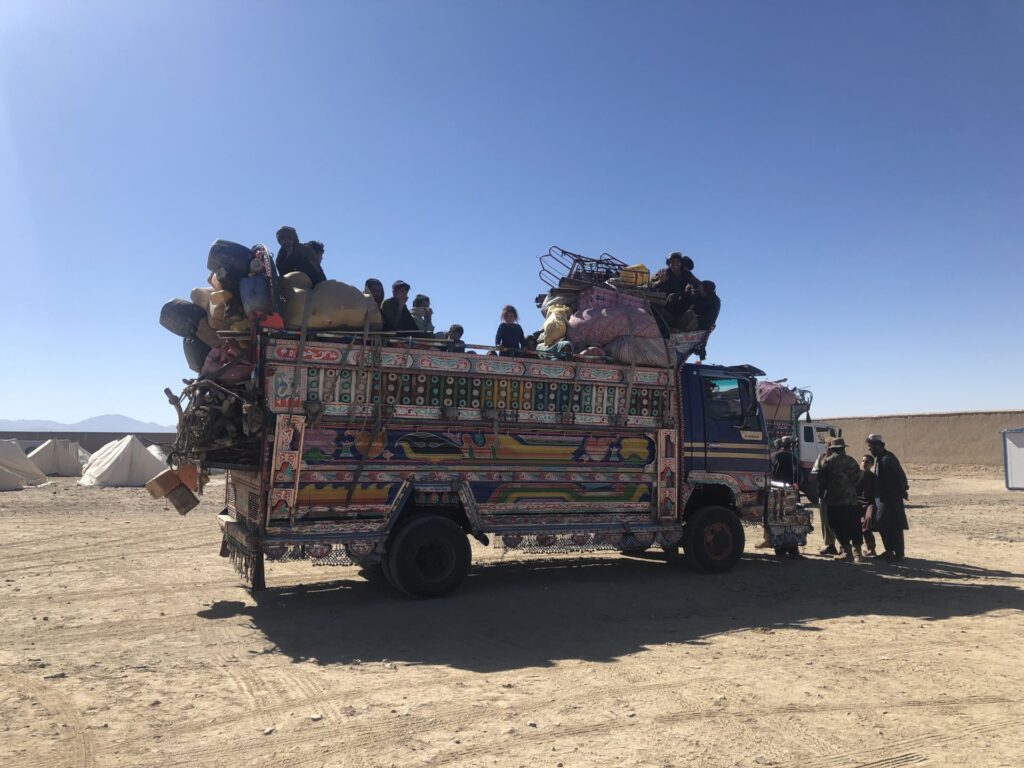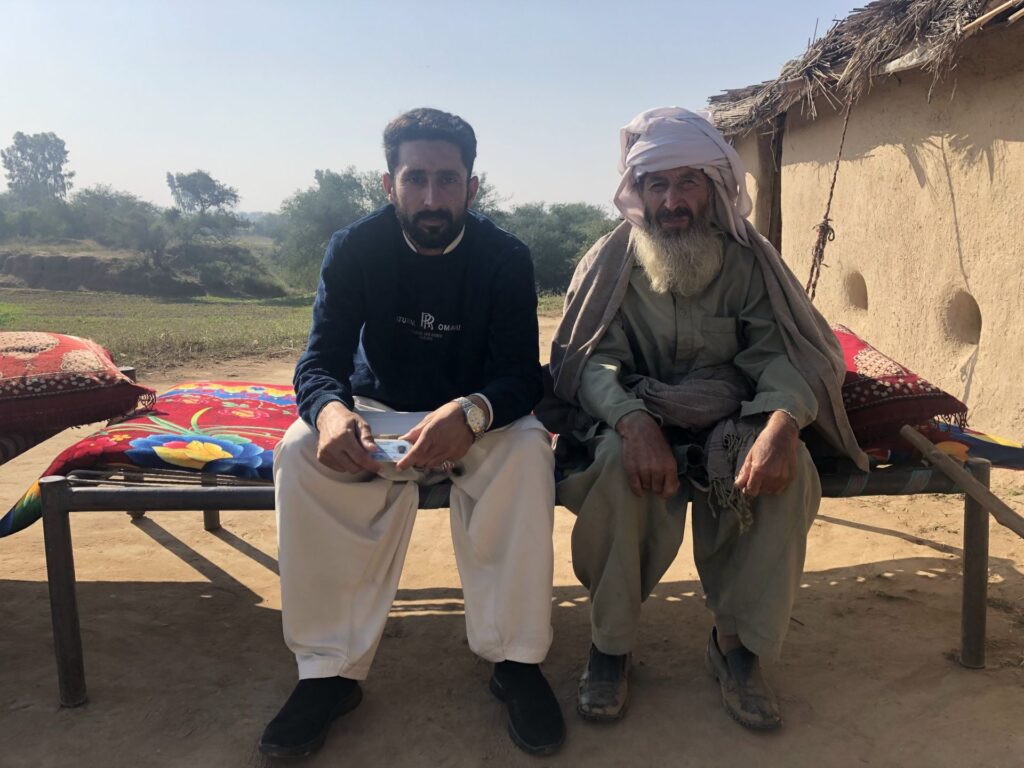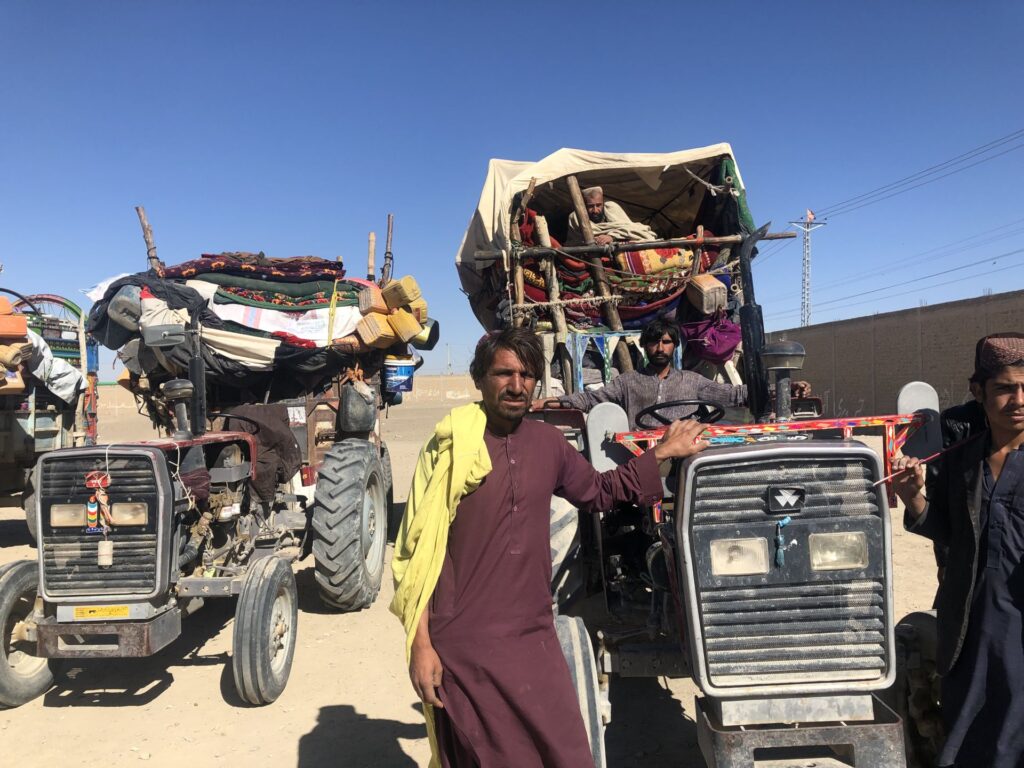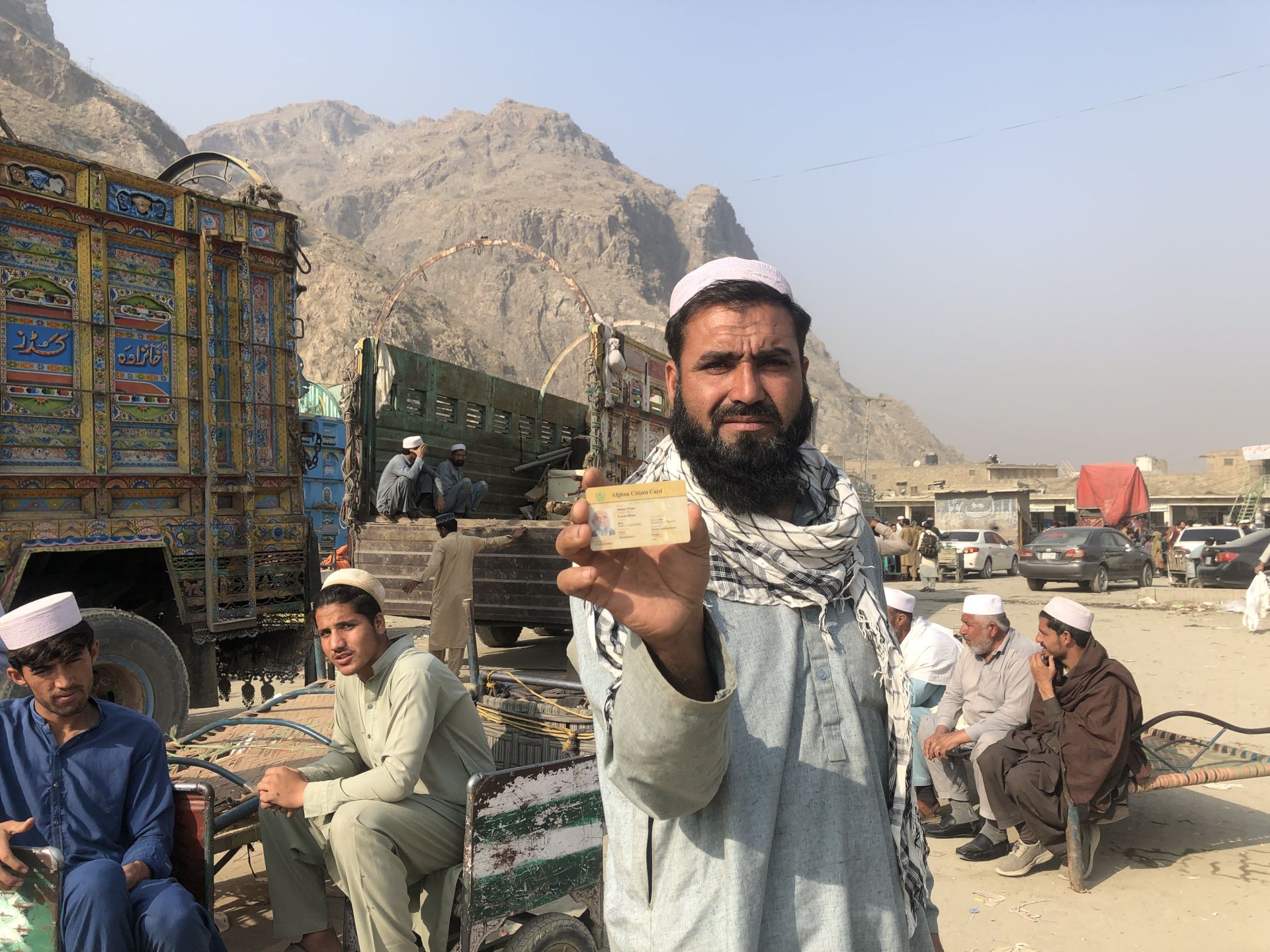Rahmat Zaman, 42, was born in the Kurram district of Khyber Pakhtunkhwa (KPK) province after his parents sought refuge in Pakistan, following the Soviet-Afghan conflict in 1979. Even though it was expected that Afghan refugees would move back to Afghanistan, as per the agreement later made between the two countries in the 1988 Geneva Accords, Zaman’s family, along with thousands of other refugee families, decided to settle and raise a family in Pakistan, because of Afghanistan’s ongoing instability.
While his father died as a documented refugee, Zaman neither has the Proof of Registration Card nor the Afghan Citizen Card, the two legal documents that allow refugees to stay in Pakistan, since he lived and worked in Abu Dhabi for a decade. “When I came back, it never occurred to me that I needed a document and circumstances didn’t allow me to make one,” he told New Lines, “If I was given more time, I could have made one using my father’s record.”
He must now leave his birthplace, along with his five daughters and wife, who will face harsher conditions, since girls and women do not have rights to education or work in Afghanistan. Zaman had three days to pack up his life in the village of Darsamand in KPK when the Pakistan government announced that all “unauthorized” Afghan refugees had to leave the country by Nov. 1. Even though he was born and raised in Pakistan like thousands of children of Afghan refugees, he was not awarded citizenship. Pakistan’s Constitution grants citizenship at birth, but this right has not been extended to Afghan refugees’ children. They cannot even apply for citizenship through the naturalization process.
Before leaving for Torkham, one of the main land crossings on the Pakistan-Afghanistan border in KPK, Zaman sold his livestock, took the wooden pillars of his house down and bought some flour and sugar to take with him to Afghanistan, but he was informed at the border that he couldn’t carry them further. “I thought I would take these with me as it would cost more in Afghanistan,” he told New Lines, with tears in his eyes.
“I spent my entire life here thinking this was my country. As I left my home behind and sold my livestock, I cried. I had just bought a cow and raised it for four months. I had to sell it,” he said. “I feel depressed. When I tore apart the walls of my house, removed the pillars, the wind started blowing and I sobbed.”
In October, caretaker Interior Minister Sarfaraz Bugti announced a 28-day deadline for all “illegal immigrants,” meaning primarily 1.73 million undocumented Afghan refugees, to leave the country or face deportation. Pakistan has been hosting Afghan refugees since the Soviet-Afghan war, when 3 million migrated to the country, and movement across the border has continued since then due to the porous and unregulated nature of the Durand Line, especially during the U.S. invasion in 2001 and fall of Kabul in 2021. UNHCR has said that as of October this year, there were 3.7 million Afghan refugees in Pakistan. By Oct. 31, more than 200,000 Afghan refugees had left the country “voluntarily,” and after Nov. 1, 49 detention centers were set up to deport the others. New border crossings were opened in Balochistan to facilitate their move.
Since Pakistan is not a signatory to any international conventions and protocols relating to refugees, and does not have any domestic legislative framework either, the whole exercise lies in murky waters, legally. “Pakistan has no refugee law, which is why every government has used Afghan refugees as a political football as per their interests,” said Moniza Kakar, a Karachi-based lawyer and human rights activist.
Pakistan has seen a resurgence in terror attacks, led by Tehreek-e-Taliban Pakistan (TTP), since the Afghan Taliban came to power. The Pakistani government holds Afghanistan responsible for the resurgence, because it feels the Taliban in Kabul have not done enough to curb cross-border terrorism and keep a check on the TTP. The decision to deport Afghan refugees is believed to be a consequence of the increasingly sour relations between Islamabad and Kabul.
All Afghan nationals that New Lines interviewed spoke in Urdu, the national language of Pakistan, as opposed to Pashto. Sabad Khan, 34, who was born in Mureed village, in Chakwal district in Punjab, said that when he visited Kabul for some work he was called a “Punjabi” by the locals. “We are not accepted there since we dress a little differently as the Taliban has strict laws. Men are not allowed to trim beards and must wear a turban. It would be difficult for us to adjust there and find work,” Khan told New Lines. Many Afghans said that they feel “helpless” because they are being sent to a country they know “nothing about,” where an “uncertain future” awaits them.
Many Afghan refugees have made efforts over the years to naturalize as citizens of Pakistan, but their claims were denied at both administrative and judicial levels. “Only a few have obtained Pakistani identity cards by settling in smaller towns and providing incorrect information to Pakistani officials,” wrote Faryal Nazir, in a report published by the European University Institute on citizenship in Pakistan.
New Lines also visited camps at two border crossings — Torkham in KPK and Chaman in Balochistan province to meet with refugees. On the way to Landi Kotal, a town 4 miles from Torkham, a series of trucks had lined up carrying Afghan families and their belongings. Children, women and men stared out, looking at an uncertain future as they left behind a country they had considered home for years.
At Chaman, a line of tents dotted the camp as Afghan families spent the night before leaving the next day. “At the camp, locals gave us food and water. They have also established medical camps here and provided us with bedding,” Saeed Ahmed, an Afghan refugee at the Chaman camp, told New Lines.

Raheem Ullah Yousafzai, 35, born to an Afghan family in Sargodha, a city in the Punjab province of Pakistan, worked as a cook in Islamabad. “The police started harassing me and wouldn’t allow me to go to work. I’m forced to leave my home behind to go to Afghanistan — a place I have never been to and know nothing about. I was living here considering Pakistan to be my country but now we are being kicked out,” he told New Lines at the Torkham border.
“All my siblings were born here, apart from my three sons and daughter.” His sons were recently enrolled in school while his daughter was studying in a madrassa (Islamic religious school). All he knows about his ties to Afghanistan is that his family belonged to Nangarhar province.
Yousafzai, who shared his home in the Khyber district of KPK with his uncle, alleged that the latter was given two months by the authorities to leave, despite being a documented Afghan refugee. “He will either sell the house or leave it behind,” said Yousafzai.
Contrary to government claims, there have been multiple reports of even documented refugees being forced to leave after facing harassment at the hands of police and the authorities. In Karachi, there were also reports that Pakistani Pashtuns, who share ethnic, cultural and familial ties with Afghans, were being deported after being called “illegal Afghans.”
In an Afghan neighborhood in Mureed village in Chakwal, people are living in a state of uncertainty and fear. After seeing raids, arrests and their relatives leaving unwillingly, many families have started selling their assets in anticipation of being asked to leave, despite having valid documents.
Noor Ali’s father had fled from Mazar-e-Sharif city in Afghanistan more than four decades ago, and Ali was born in Pakistan along with four of his siblings. Zaman Khan, Ali’s uncle, who had fled Afghanistan with his brother, said, “When I fled Afghanistan, our family had to sell everything as we are doing now. As I once again prepare to leave, I feel like I am reliving those days. We came empty-handed and made a life for ourselves here and we will be returning empty-handed.”
Ali alleged that earlier this month, his cousins, who were born in Pakistan and had Afghan Citizen Cards, were taken by the police and deported to Afghanistan. “Ever since this incident happened, my father keeps saying that if they were harassed and kicked out, it will also happen to us. So, he has started selling his livestock in preparation.”

The government extended Proof of Registration for 1.3 million documented Afghans, allowing them to stay in the country until Dec. 31. However, conflicting statements by the government have left many confused. “We have always felt like Pakistan is our country. We wish Pakistan considered us its citizens too. For those of us born here, we are neither citizens of Afghanistan nor of Pakistan, we have no country that is truly ours.”
Muhammad Yaqoob, 25, born in Quetta in Balochistan province, had never set foot outside the city till he had to leave for the Chaman border. “This journey was new to me. My heart doesn’t agree with going to Afghanistan because I have never seen that country and my entire life was in Pakistan. When I will cross the border, I don’t know where I will go,” Yaqoob told New Lines from a camp where refugees had been kept before deportation.
His mother was only two when her family migrated to Pakistan. “We have never considered ourselves refugees and always thought we were from here. We were harassed by the police before the deadline passed. I can’t even say that we are unhappy about leaving because we are scared that we will be harassed further,” he said.
The family had to leave behind their house worth 5 million rupees (roughly $18,000) since buyers weren’t offering more than 500,000. When Yaqoob tried to cross the border on his tractor, he was told he could not take it with him. “I can’t leave my tractor behind at any cost. It is my only source of livelihood. We’re leaving behind our house, but I can’t compromise on my tractor. If I am not allowed to take it with me, then I will burn myself and my family here with it,” he said, while pleading to authorities.

Similarly, Muhammad Rasool, 38, who was a year old when his family fled from Afghanistan, has lived in Karachi since then, where he raised five sons and four daughters while working as a tailor. After the government announcement, Rasool, like many Afghans, didn’t leave his home for days out of fear. When the police started forcibly deporting families in his neighborhood, he decided to leave with respect. “I sold my home — it was worth 5 million, but nobody was willing to buy it for more than 2 million,” he told New Lines when we met him at the Chaman border.
Meanwhile, the state of affairs in Afghanistan remains grim. Unemployment and hunger are at a record high and in October the country experienced one of its deadliest earthquakes, which killed over 3,000. An oppressive regime has denied opportunities for work and education to Afghan women and girls.
Rasool’s children were enrolled in schools in Pakistan. “We’re taking their school bags with us. One of my daughters was in tenth grade, but now that’s the end of their education. I have never been to Afghanistan, and it is like I am blind and will be opening my eyes for the first time when I cross the border and go to a land I do not know anything about. Our hearts are crying.”
“Spotlight” is a newsletter about underreported cultural trends and news from around the world, emailed to subscribers twice a week. Sign up here.



